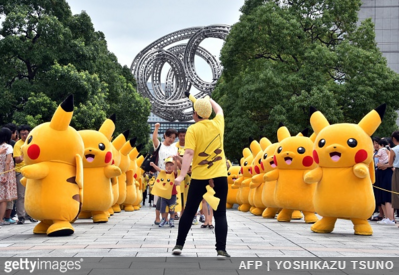In the wake of Pokémon’s 20th anniversary, many are wondering what made the series so successful. Many of us spent our youth capturing, battling and trading Pokémon. We’ve been around since the early days, but Pokémon isn’t merely a fond memory of the past. Some of us are still playing and are currently waiting with anticipation for Pokémon GO.
Whether it was watching Saturday morning cartoons or picking it up for our Gameboys, Pokémon has been entrenched in our social identity. Pokémon has been described as the dividing line between Generation X and Millennials. It’s hard to think of that as an exaggeration when you look at the demographics. Pokémon Black & White (2010) was purchased primarily by the 16-24 age group. Ever since, the games have been marketed predominately to older players — just check at this recent Super Bowl commercial:
Most people attribute the appeal to the collection process. They focus on the slogan “Gotta catch em all!” While playful and catchy, it’s never really been the main focus of the games. Even Ash Ketchum only catches 14 Pokémon by the end of the first region. The games themselves are made so that catching all the Pokémon is nearly impossible. The real appeal comes from the personality of the game and how you create your own identity in that sphere.
It’s a game about creating your character as you progress. Which Pokémon looks cool, looks cute, looks tough or looks smart? That’s who I want in my party, and the game teaches you this. The trainers you encounter always have Pokémon centered around a theme they embody. You have the supernatural fanatics with their ghost types, mountaineers with their rock types, fitness trainers with their fighting types, swimmers with water types … you get the idea. The game suggested right from the beginning that you build a party not based on type advantage or strength but rather on personality.
This goes beyond the limitations of just the gamespace. Many of us encountered Pokémon at a very young age. I remember seeing Gold version at my friend’s house in 2000 and thinking it was the coolest thing. The thought of going out and exploring the world on foot or by bike was really appealing to me. It wasn’t until next year that I actually got my hands on Pokémon Crystal. But before that, I, along with millions of other kids, was watching Ash Ketchum collect badges and slowly make his way to the Pokémon League.
I think the lessons emphasized in the Pokémon narrative have greatly influenced our personalities, to the point that they define us as a generation. While Pokémon is certainly not the only factor that separates millennials from other generations, consider some of the themes in the Pokémon narrative.
The protagonist does not feel bound to their home. The main objective is to travel and explore. There is no central location that you feel loyal to. If anything, you’re only concerned with the protection of nature and the world at large. The variations of Team Rocket represent the opposing force that threatens society, typically operating at one of two ideological extremes: the capitalist force that sees Pokémon as a resource to be harvested and the naturalist force that sees humanity (or other Pokémon) as a threat to Pokémon. The solution is always an emphasis on symbiosis with nature and the necessity of biodiversity.
There is also some conflict in this, as the overall idea of the games is to acquire as many Pokémon as possible. The relationship between Pokémon and trainer is ambiguous through most of the games. You can play as a trainer who catches hundreds of Pokémon, or you can beat the entire game with just one.
How much a player “cares” for their Pokémon can vary wildly and becomes a matter of one’s suspension of disbelief. At the time when Pokémon was invented, Japan was struggling to find a balance between economic development and environmental protection. Ironically, this led to a society whose major export is culture and icons like Pokémon.
Neither mine nor anyone else’s interests are wholly formed simply on the morals of the Pokémon TV show, but I find it interesting that some of the themes that I feel most strongly about are present in games I’ve been playing since childhood. The personality of the Pokémon games never changes, which is perhaps why millennials love the series so much.



Rach • Nov 21, 2021 at 9:02 pm
The various villainous teams aren’t “variations of Team Rocket”, most of them are ideological extremists rather than being focused on money. It’s like saying that all of the regions are “variations of Kanto”.
Also the slogan “gotta catch ’em all” was coined by a dunce named Norman Grossfeld, who had no knowledge or involvement with the games. He was a member of 4Kids Entertainment (the company that dubbed the anime into English, and is notorious for being willfully ignorant of all their properties and butchering their dubs). The goal of the games (that the games actually reward you for) is mastering the league and getting good at battling. Completing the Pokédex (i.e. catching one of each species of Pokémon) doesn’t get you much in most games.